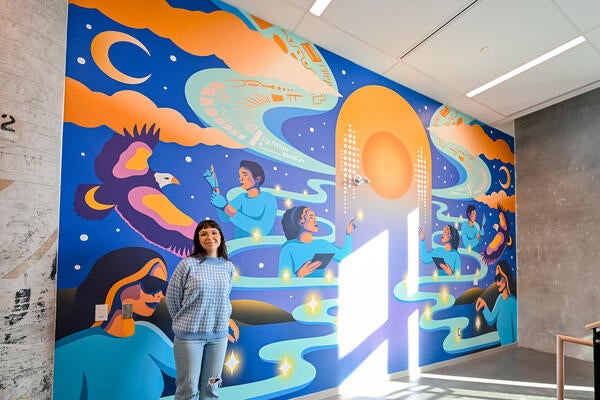
Supporting corporate innovation at every size
Companies like Able Innovations are solving important problems with help from Velocity

Companies like Able Innovations are solving important problems with help from Velocity
By Marine Dumontier VelocityThe University of Waterloo has a long history of supporting corporate innovation through talent and partnerships, like the Rogers 5G partnership, and through support systems such as the Velocity incubator.
While 74 per cent of Velocity startups have one or more founders that studied or worked at the University of Waterloo, Velocity also attracts global startups. In 2021, the incubator, which can accommodate up to 20 new companies per year, received more than 200 qualified applications.
“Velocity’s connectivity with the University of Waterloo is one of the incubator’s key strengths. The University of Waterloo streamlines engagement with amazing students and renowned research groups while Velocity supplies founders with funding, business connections, expert advice and space to quickly and cost-effectively turn prototypes into scalable businesses,” says Adrien Côté, executive director at Velocity.
Able Innovations™, one of Velocity’s portfolio companies, is solving the painful and labour intensive process of patient transfers by developing robotic technology that enables effortless, single-caregiver, safe and dignified transfers. Jayiesh Singh, Co-Founder and CEO of Able Innovations, met Colin Russell, Waterloo’s managing director, partnerships, while Colin was leading Waterloo’s Centre for Bioengineering & Biotechnology (CBB). Through Russell and the CBB, Singh connected with experts, investors and partners, such as the Research Institute for Aging. He also hired several co-op students from Waterloo — some later joined the company as full-time staff — and eventually landed $50,000 from the Velocity Fund and Velocity Health Tech Fund, and an invitation to join the incubator.
“Through Velocity, Able was able to grow its network of advisors, mentors as well as the extended network of aligned investors and commercial partners,” Singh says. “The high quality of the Velocity network has helped Able substantially in its journey thus far.”
Proximity to the University of Waterloo was key to Able Innovation’s growth. The team is currently working closely with Professor Amir Khajepour, who leads another autonomous vehicle project: WATonobus.
“Rogers is working with Waterloo to realize the business potential of their 5G network and real-time computer resources. Waterloo’s research is building the technology that makes it possible. Able is working with both partners to realize the business potential of their technology,” Russell says. “I saw Able grow from a digital concept to a working prototype to building a company that will eventually provide healthcare facilities with fleets of autonomous devices that will support a more sustainable health-care environment.”
This collaboration leverages the ground-breaking work with WATonobus and aims to integrate it into healthcare facilities through integration with the ALTA Platform™. The ALTA Platform is an autonomous bed that will transfer supine patients who need to be moved from bed to stretcher or stretcher to imaging table in healthcare facilities. Lifting and transporting of patients involves a considerable amount of time and physical labour. While the task of patient transfer is challenging, it is necessary and provides great opportunity for automation. In an industry currently experiencing staff turn-over and high burn-out rates, exacerbated by the ongoing pandemic, technologies like ALTA could help solve worker shortages and provide safer, better care and improve health outcomes for both patients and health-care professionals.
By supporting companies like Able Innovations with access to research, corporate partnerships, funding and space to build and scale their technologies at Velocity, the University of Waterloo is helping strengthen Canada’s healthcare tech ecosystem.

Read more
How Doug Kavanagh’s software engineering degree laid the foundation for a thriving career in patient care

Read more
Many Hearts, One Mind by Indigenous artist Alanah Jewell celebrates the act of creation shared by the Land and innovators in our community

Read more
Redefining capstone learning by bringing students, faculty and community partners together to tackle real-world challenges
The University of Waterloo acknowledges that much of our work takes place on the traditional territory of the Neutral, Anishinaabeg, and Haudenosaunee peoples. Our main campus is situated on the Haldimand Tract, the land granted to the Six Nations that includes six miles on each side of the Grand River. Our active work toward reconciliation takes place across our campuses through research, learning, teaching, and community building, and is co-ordinated within the Office of Indigenous Relations.